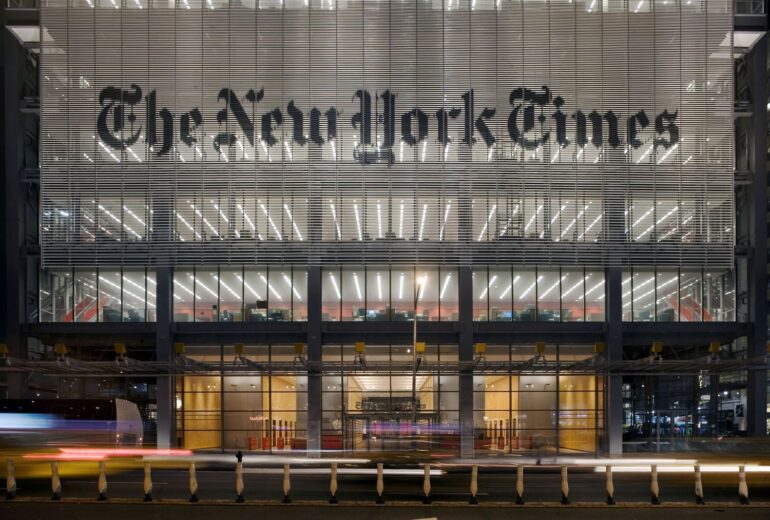TL;DR:
- The New York Times has filed a lawsuit against OpenAI and Microsoft over alleged copyright infringement in using Times’ articles to train ChatGPT.
- OpenAI claims “fair use” principles, arguing they transform the content into something new.
- The lawsuit raises questions about data use rights and the need for new legal frameworks in the AI age.
- The dispute highlights the challenges in balancing AI advancements with copyright protection.
- The use of language in describing AI processes also comes under scrutiny.
Main AI News:
The lawsuit filed by The New York Times against OpenAI carries significant implications for the advancement of machine intelligence. Back in 1954, the Guardian’s science correspondent delved into the world of “electronic brains,” machines that possessed a memory enabling rapid retrieval of information, like airline seat assignments, in mere seconds. The terminology of those times was novel to most, and the concept of an “electronic brain” held immense potential.
Today, in 2024, your microwave boasts more computational power than anything resembling a brain from the 1950s. Yet, the realm of artificial intelligence presents fresh linguistic and legal challenges. Recently, The New York Times initiated legal action against OpenAI and Microsoft, owners of the popular AI-based text-generation tool ChatGPT, alleging the unauthorized use of Times’ articles in training and testing their systems.
Their contention revolves around OpenAI’s supposed copyright infringement through the utilization of their journalism in ChatGPT’s development. OpenAI, in response, has cautiously cited “fair use” principles, asserting that they transform the original work into something new – the text generated by ChatGPT.
At the heart of this matter lies the question of data utilization. What data rights do companies like OpenAI possess, and how should we interpret the term “transform” within this context? These questions, concerning the data powering AI systems like ChatGPT, continue to fuel intense academic debates, with legal frameworks often trailing behind industry practices.
While AI may seem like a means to an end when it comes to handling emails or summarizing work, it raises concerns if achieving those ends requires exemptions for specific corporate entities from universally applicable laws. Such a shift could not only alter the landscape of copyright litigation but also reshape the foundations of legal systems within societies.
Crucial Considerations
These cases not only raise complex questions about the future of legal systems but also challenge the very existence of AI models. The New York Times perceives ChatGPT as a long-term threat to their newspaper, while OpenAI claims to collaborate with news organizations to foster innovative opportunities in journalism. They assert their commitment to “support a healthy news ecosystem” and be a responsible partner.
Even if we acknowledge AI systems as essential for the future, dismantling the data sources that initially trained them appears ill-advised. This concern resonates not only with entities like The New York Times but also with creators like George R.R. Martin and platforms like Wikipedia.
Supporters of extensive data collection, which fuels Large Language Models (LLMs) like ChatGPT, argue that AI systems “transform” data through “learning” from their datasets and generating novel content. In essence, researchers provide human-written data and task the systems with predicting the next words, similar to real user interactions. By concealing and revealing these answers, researchers enable binary “yes” or “no” assessments that enhance AI system accuracy. Hence, LLMs rely on vast volumes of written texts.
If one were to duplicate articles from The New York Times website and charge for access, it would likely be deemed “systematic theft on a mass scale,” as stated in the newspaper’s lawsuit. However, improving AI accuracy using data guidance, as outlined above, is a more intricate process.
Firms like OpenAI do not retain their training data, contending that The New York Times’ articles incorporated into the dataset are not reused. Nevertheless, a counter-argument suggests that systems like ChatGPT can unintentionally “leak” verbatim content from their training data. OpenAI labels this as a “rare bug,” but it implies that these systems inadvertently store and recall data, potentially bypassing paywalls established by for-profit publications to safeguard intellectual property.
The Power of Language
One aspect poised to have a lasting impact on our approach to legislation is our choice of language. Most AI researchers agree that terms like “learning” inadequately describe AI’s actual processes. The pertinent question arises: Is our current legal framework sufficient to safeguard and foster society amid the rapid rise of AI? “Transformative use” – the concept of building on existing copyrighted work in a manner distinct from the original – serves as OpenAI’s defense.
However, these legal frameworks were initially designed to encourage remixing, recombination, and experimentation with publicly available work, not to protect multi-billion-dollar technological marvels operating at speeds and scales beyond human capabilities. Many arguments supporting extensive data collection and usage rely on linguistic peculiarities, such as describing AI as “learning,” “understanding,” or “thinking.” These analogies, while convenient, do not offer precise technical descriptions.
Just as in 1954, when people likened modern calculators to “brains,” we now employ outdated language to grapple with entirely novel concepts. Regardless of the terminology, systems like ChatGPT do not function like human brains, and AI systems hold distinct societal roles compared to humans. To navigate this evolving landscape, we may need not only new language but also new legal frameworks to safeguard our society in the 2020s.
Conclusion:
The ongoing lawsuit between The New York Times and OpenAI signifies a pivotal moment in the intersection of AI and law. It highlights the need for a comprehensive reevaluation of legal frameworks and language to adapt to the challenges posed by AI technology. This legal battle has broader implications for the market, potentially reshaping how businesses approach data usage, intellectual property, and collaboration with AI models. Companies must remain vigilant in understanding the evolving legal landscape to ensure they navigate it effectively.

